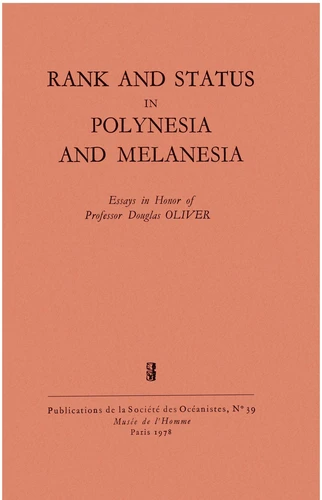Rank and Status in Polynesia and Melanesia. Essays in honor of professor Douglas Oliver
Par :Formats :
Disponible dans votre compte client Decitre ou Furet du Nord dès validation de votre commande. Le format Multi-format est :
- Pour les liseuses autres que Vivlio, vous devez utiliser le logiciel Adobe Digital Edition. Non compatible avec la lecture sur les liseuses Kindle, Remarkable et Sony
 , qui est-ce ?
, qui est-ce ?Notre partenaire de plateforme de lecture numérique où vous retrouverez l'ensemble de vos ebooks gratuitement
Pour en savoir plus sur nos ebooks, consultez notre aide en ligne ici
- Nombre de pages93
- FormatMulti-format
- ISBN978-2-85430-106-9
- EAN9782854301069
- Date de parution03/04/2014
- Protection num.NC
- Infos supplémentairesMulti-format incluant PDF avec W...
- ÉditeurSociété des Océanistes
Résumé
One of the less fortunate legacies that we who practice ethnography in Oceania have given the scholarly world is the stereotype of the Melanesian leader as "Big Man". The designation "Big Man", derived literally from the metaphor commonly used in Austronesian languages or from the Neo-Melanesian Pidgin lexicon, has come to denote a "pure type" or "species" of leadership, authority and government. (Rightly or wrongly, ethnographic sources usually ignore women's role in government, although they may have significant impact).
In countless introductory anthropology courses students are asked to accept and perpetuate the cliches that Melanesian leaders typify achieved rather than ascribed status, that Melanesian leaders are archetypal symbols of primitive capitalistic competition, and that Melanesian leadership represents an inferior form.
In countless introductory anthropology courses students are asked to accept and perpetuate the cliches that Melanesian leaders typify achieved rather than ascribed status, that Melanesian leaders are archetypal symbols of primitive capitalistic competition, and that Melanesian leadership represents an inferior form.
One of the less fortunate legacies that we who practice ethnography in Oceania have given the scholarly world is the stereotype of the Melanesian leader as "Big Man". The designation "Big Man", derived literally from the metaphor commonly used in Austronesian languages or from the Neo-Melanesian Pidgin lexicon, has come to denote a "pure type" or "species" of leadership, authority and government. (Rightly or wrongly, ethnographic sources usually ignore women's role in government, although they may have significant impact).
In countless introductory anthropology courses students are asked to accept and perpetuate the cliches that Melanesian leaders typify achieved rather than ascribed status, that Melanesian leaders are archetypal symbols of primitive capitalistic competition, and that Melanesian leadership represents an inferior form.
In countless introductory anthropology courses students are asked to accept and perpetuate the cliches that Melanesian leaders typify achieved rather than ascribed status, that Melanesian leaders are archetypal symbols of primitive capitalistic competition, and that Melanesian leadership represents an inferior form.



